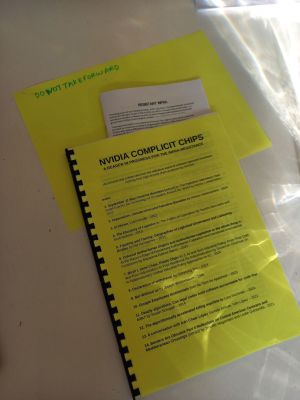Complicit Chips Reader
Complicit Chips: A Reader in Progress for Infra-Resistance

This (ever in progress) reader was put together at the occasion of the Complicit Chips worksession, in which we tried to approach the involvement of the computer industry in organised violence at borders and in occupied territories.
The collection of texts wasn’t assembled with the goal of covering all aspects surrounding the complex conflations of software, hardware, global finance, digital aesthetics, securitisation and militarisation. Rather, it aims to provoke thoughts, trigger conversations and support our collective attempt to articulate interdependencies between global financing, AI, hardware development, and computer graphics. How to resist the deep complicity of these industries in extreme violence, inflicted on sites of extraction, on occupied territories and on migrating bodies?
We hope that, beyond the context of the worksession, the circulation of this reader can support fellow comrades sharing the desire to pursue divestment from an industry which provides the material means to both our most mundane activities and human rights violations all at once and fully intertwined.
This reader was put together by Femke Snelting, Helen Pritchard and Sofia Boschat Thorez in October 2024. If you have any remarks, suggestions, or work you would like to share for a next version, please reach out to us at: titipi@titipi.org
And if you would consider adopting software attempts at not being complicit in supporting the genocide in Palestine, you can consult the following booklet: https://titipi.org/pub/infraresistance.pdf
Index
- September 11 Was Good for Business [extract] in: The Palestine Laboratory: How Israel Exports the Technology of Occupation Around the World by Antony Loewenstein – 2023
- Imperialism, climate crisis and Palestine liberation by Hamza Hamouchene – 2024
- In Clover, Laleh Khalili – 2022
- The Elasticity of Logistics in: The Politics of Operations by Sandro Mezzadra and Brett Neilson – 2019
- Tracking and Tracing: Geographies of Logistical Governance and Labouring Bodies by AM Kanngieser – 2013
- Colonial Authoritarian Origins and Authoritarian capitalism or the whole thing in: At the Razor’s Edge of Democracy Authoritarian Capitalism and Decolonial International Feminisms by Macarena Gómez-Barris – 2021
- Bush I, Semi Chips, Potato Chips in: AI and Tech Industrial Policy: From Post-Cold War Post-Industrialism to Post-Neoliberal Re-Industrialization by Susannah Glickman (in AI Nationalism(s): Global Industrial Policy Approaches to AI) – 2024
- Declaration of withdrawal by Shinjoung Yeo – 2023
- Not Without us by Joseph Weizenbaum – 1986
- Google Employees testimonials from No Tech for Apartheid – 2023
- Deadly algorithms: Can legal codes hold software accountable for code that kills? by Susan Schuppli – 2014
- The algorithmically accelerated killing machine by Lucy Suchman – 2024
- A conversation with Iván Chaar López by Sareeta Amrute and Iván López – 2022
- Borders Are Obsolete Part II Reflections on Central American Caravans and Mediterranean Crossings [extract] by Jennifer Mogannam and Leslie Quintanilla – 2021
- Refusing Control Abolish Frontex: a decentralised campaign fighting the EU Border Regime by Sanne Stevens – ?
- The First Step Is Finding Each Other by Timmy Châu in Resisting Borders and Technologies of Violence – 2024
- Submitting a consultation on the White Paper: 'On options for enhancing support for research and development involving technologies with dual use potential' by Various Irish Scholars – 2024
- Voluptuous Disintegration: A Future History of Black Computational Thought by Romi Morrisson – 2022
- There is no software [extract from introduction] by Irina Kaldrack and Martina Leeker – 2015
- Introduction: Spoilers Ahead [extract] in: Spoiler Alert A Critical Guide by Aaron Jaffe – 2019
- The decline of computers as general purpose technology by Neil C. Thompson and Svenha Spanuth – 2019
- In the mouth of a polar bear: The undead feeling of the world in: The Anti-Menagerie by Helen V. Pritchard and Cassandra Troyan – 2021
- The “Just in Time” Explosion of Pagers and the New Technologies of Death By Deivison Faustino and Walter Lippold – 2024
- For opacity in: Poetics of Relation by Édouard Glissant – 1990
- A Reverse-Engineered Insurrection by Miriyam Aouragh – 2020